
Titanium Elbows are precision-engineered pipe fittings used to change the flow direction in piping systems, typically by 45°, 90°, or 180°. Manufactured from high-quality titanium (commercially pure or alloyed), they offer outstanding corrosion resistance, light weight, and high strength, making them ideal for chemical processing, marine, aerospace, and desalination systems.
Titanium elbows are available in both seamless and welded forms, compliant with international piping and pressure vessel standards. We can supply regular standard parts and have stock, and we can produce customized parts according to your drawings.
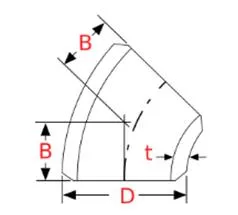
Titanium 45-degree elbows are used to change the direction of flow in a piping system. They are available in Long Radius (R=1.5D) and Short Radius (R=1.0D) types.
Long radius elbows offer smoother flow, while short radius elbows are ideal for compact installations.
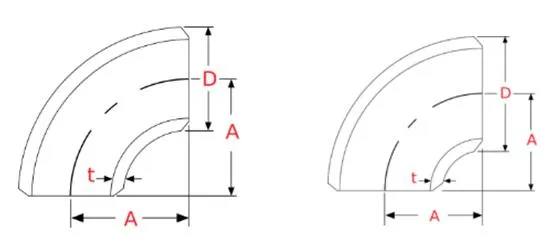
Titanium 90-degree elbows are used to change the direction of flow in piping systems. Available in:
Long Radius (R=1.5D): Allows smoother flow and reduced pressure drop.
Short Radius (R=1.0D): More compact for tight spaces but slightly higher flow resistance.
End types: Beveled, Socket Weld.
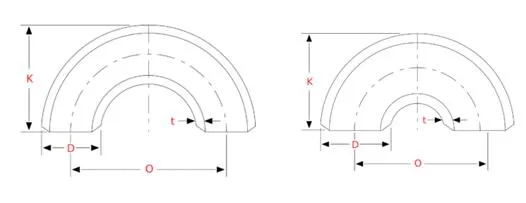
Titanium 180-degree elbows, also known as U-bends or return bends, are designed to reverse flow direction in a piping system. They are widely used in heat exchangers, condensers, and chemical piping systems. R-value (bending radius) and end treatments (Bevel, Plain, Threaded) can be customized according to customer requirements.
1. Raw Material Preparation---Titanium tube is cut to desired length and inspected.
2. Heating---Heated to forming temperature using induction or resistance furnace.
3. Die Forming (Hot Pressing)---Bent and pressed into shape using elbow forming dies.
4. Heat Treatment (Annealing)---Relieves stress and refines grain structure.
5. Shaping & Straightening---Calibrated for dimensional accuracy.
6. Surface Pickling or Sandblasting---Improves surface finish and removes scale.
7. Inspection---Dimensional check, surface inspection, NDT if required.
8. Marking & Packaging---Laser marking and protective export packaging.
Titanium Elbows are precision-formed pipe fittings used to redirect flow in piping systems, typically at 45°, 90°, or 180°. Fabricated from titanium welded pipe or plate and manufactured according to ASTM B363, they combine corrosion resistance with cost-efficiency, especially in large-diameter or non-standard fittings. Compared to seamless elbows, welded elbows are better suited for low- to medium-pressure systems and can be custom fabricated to meet specific dimensional or alloy requirements, especially in chemical processing, desalination, and environmental equipment.
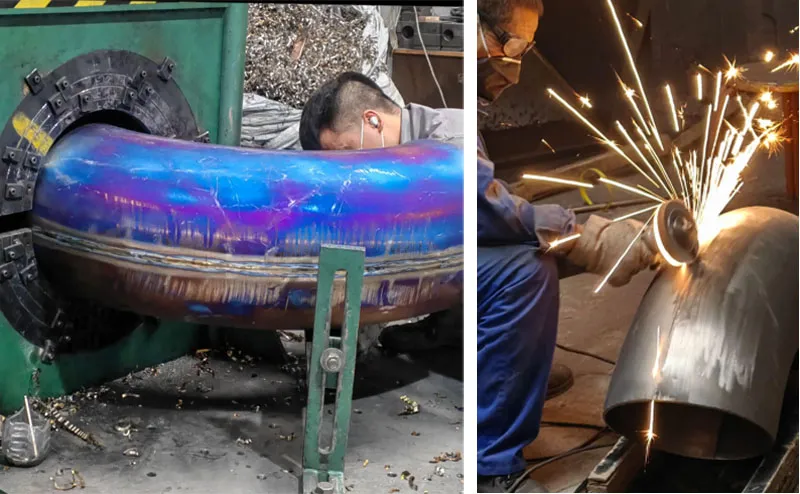
Industry & Chemical Processing
Corrosive pipeline elbows in acid, alkali, or chloride media
Titanium elbows for chemical reactors and high-purity fluid lines
Heat exchanger elbows
Chlor-alkali industry piping
Titanium elbows for sulfuric acid and nitric acid systems
Electroplating and anodizing line elbows
Marine & Desalination
Seawater desalination piping elbows
Marine pipeline elbows for ships and offshore platforms
Subsea pipeline elbow fittings
Saltwater circulation systems
Aerospace
Lightweight titanium elbows for aircraft hydraulic systems
High-pressure aerospace piping elbows
Military-grade titanium pipe elbows
Rocket propulsion or fuel line elbows
Biopharma & Medical
Titanium elbows for sterile fluid systems
Biopharma-grade titanium elbows for CIP/SIP piping
Biocompatible elbows for implantable fluid control systems
Energy & Power
Nuclear plant piping elbows
Geothermal pipeline elbows (anti-corrosive)
Battery and hydrogen production lines
Renewable energy (solar, hydrogen) pipework
General/Utility
Titanium elbows for industrial gas distribution lines
Vacuum and high-purity gas piping
Clean room and semiconductor plant use
Custom elbows for OEM systems & skid units
1.Dimensional Inspection: Verifies outer diameter, wall thickness, center-to-end, and bend radius.
2.Chemical Composition Analysis: Ensures compliance with standards like ASTM B363.
3.Mechanical Property Test: Tensile strength, yield strength, elongation, etc., based on mill reports.
4.Visual Inspection: Checks for surface defects such as cracks, dents, scratches, or weld flaws.
5.Ultrasonic Testing (UT): Detects internal flaws like inclusions, cracks, or voids.
6.Penetrant Testing (PT): Used to detect surface-breaking defects on non-magnetic materials.
7.Radiographic Testing (RT): X-ray or gamma-ray inspection for weld quality.
8.Hydrostatic Test: Confirms no leakage under pressure, typically for pressure-bearing elbows.
9.Positive Material Identification (PMI): Rapid verification of titanium type and grade.
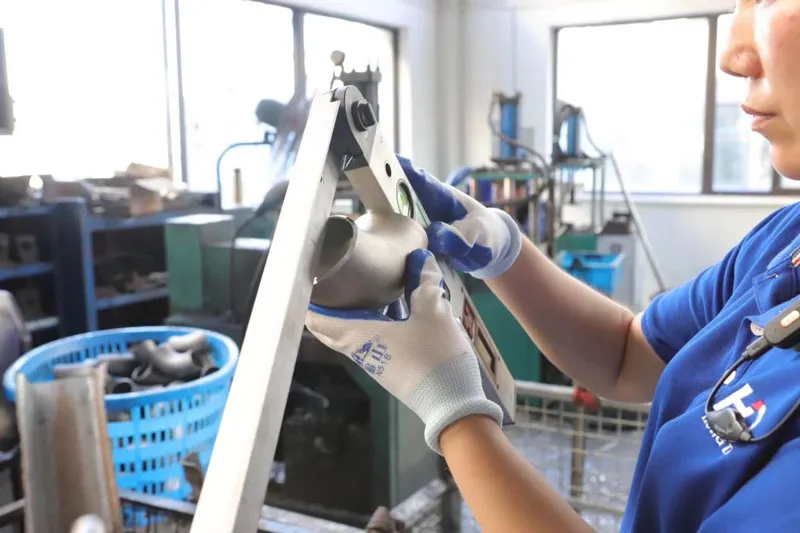
Each titanium elbow is carefully packed to ensure protection against mechanical damage, corrosion, and contamination during transportation and storage.
Inner Protection:
Plastic film wrap (PE or PVC) for each fitting
Anti-rust paper or sealed plastic bags (if required)
End caps or plugs for large elbows to prevent dust and damage
Outer Packing:
Strong plywood cases (export-grade, fumigation-free)
With foam padding, bubble wrap, or soft lining inside
Clearly labeled with product information, heat number, and quantity
Marking on Case:
Product name, Grade, Size, Quantity, Heat No., and Order No.